Holocaust Memory in a Time of Genocide
Israeli historian Amos Goldberg asks: What is the meaning of Holocaust memory in a reality where Israel is committing genocide?
In memory of my dear friend, the historian Alon Confino, who died on June 27, 2024, and whose intellectual, moral, and political spirit permeates every line of this essay.
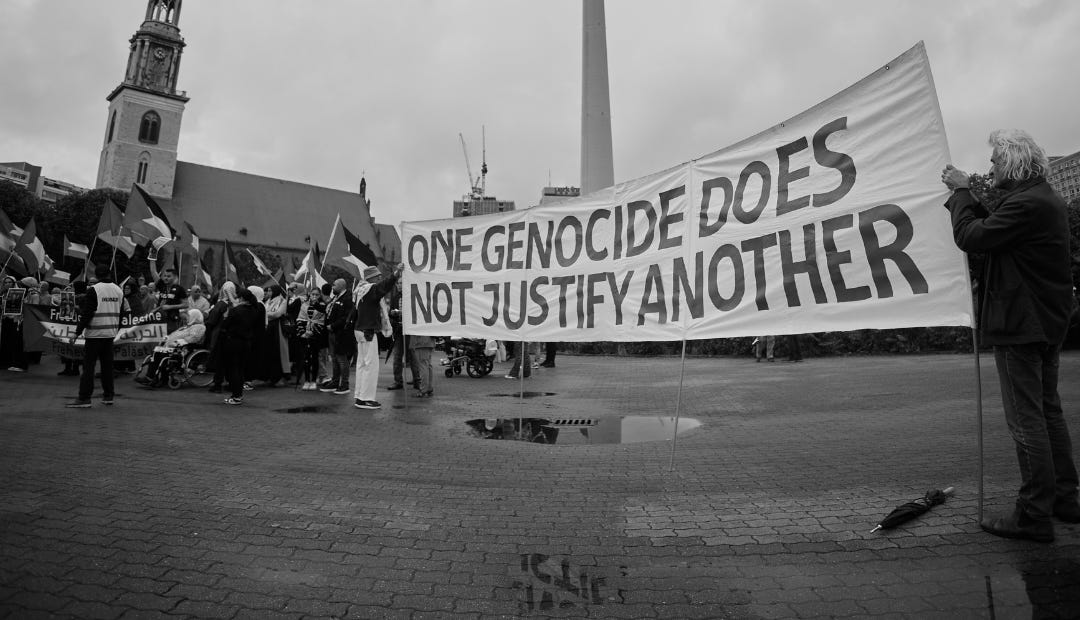
The question I wish to address – very partially and preliminarily in this essay – is: what is the meaning of Holocaust memory in a reality where Israel, and most of the West, especially the US and Germany – countries that have made Holocaust memory a central component of their identities and a moral imperative for the world – is committing genocide?
In his 2012 book Foundational Pasts, Alon Confino argued that the Holocaust serves as a “foundational past” for the West, and perhaps beyond it. By “foundational past,” Confino meant a past event that serves as a benchmark by which to judge history, moral values, and human behavior in general. Indeed, since the 1980s and certainly from the 1990s onward, the Holocaust has served the West as a powerful moral and historical symbol of what the West claimed to represent: liberal democracy and human rights. It claimed to adhere to these values as the lesson they learned from the Holocaust.
The most significant years for the consolidation, shaping, and especially institutionalization of Holocaust memory were the two decades between 1985 and 2005. During these years, most of the significant institutions and cultural works in the field were established. Among them are Claude Lanzmann’s film ‘Shoah’ from 1985; the launch of the journal Holocaust and Genocide Studies in 1986; the opening of the US Holocaust Memorial Museum in Washington in 1993, and in the same year, the release of the film ‘Schindler’s List’; the establishment of the International Task Force for Cooperation on Holocaust Education, Remembrance and Research (ITF) in 1998 – which was affirmed in the 2000 Stockholm Declaration and later became the IHRA; the inauguration of the Memorial to the Murdered Jews of Europe in Berlin in 2005; and the opening of the new Yad Vashem Museum in Israel that same year. Also in 2005, the UN declared January 27 as International Holocaust Remembrance Day.
The consolidation of Holocaust memory as a dominant element in European and Western identity was a highly complex process. It was tied to the immense traumatic and historical weight of the events for Jews – and in different ways for the peoples of Europe – but also to major historical developments such as the end of the Cold War, the unification of Germany, and the founding of the European Union.
Inherent Tensions in Holocaust Memory
From the beginning – and especially throughout the 1990s – Holocaust memory in the West was charged with two different sentiments. The first is a sentiment I would call “democratic” or “human rights–oriented.” This sentiment was embodied in the slogan “Never again.” The world pledged itself to human rights, to curbing nationalism, and to strengthening democracy as a lesson from the Holocaust. The second sentiment was empathy toward the Jews as the primary victims of Nazism, and their perception as Europe’s ultimate “Other.” These two sentiments infused Holocaust memory – and the academic field of “Holocaust studies” – with its moral energy, gave it meaning and significance, and attracted committed activists and outstanding scholars.
Yet from the very beginning, there was a certain tension between these two sentiments. The first appeared universal, while the second remained highly particular – focused on the Jews. From the outset, Holocaust memory was required to reconcile these two sentiments, especially in the context of Israel. From the "particularist" perspective, Israel was seen as the state of Holocaust survivors, deserving of all empathy and understanding. It was also viewed as the ultimate moral response to European antisemitism, which had culminated in the Holocaust. From the "democratic human rights" perspective, however, as the occupation deepened, became an overt apartheid, and the memory of the Nakba resurfaced, Israel was seen as an increasingly undemocratic state, seriously violating the human rights of Palestinians.
However, the 1990s – when, as noted, the institutions and assumptions of “global” Holocaust memory were consolidated – were also the “Oslo years,” during which Israel was seen as a peace-seeking country on the verge of resolving its conflict with the Palestinians. Therefore, the contradiction was still tolerable. Elie Wiesel is a good example of this. On the one hand, Wiesel demanded – with great urgency – that the world be attentive to all human suffering in the wake of the Holocaust, even calling for political and sometimes military intervention to reduce injustices around the world. On the other hand, he made an exception for the State of Israel, defending it from any criticism regarding its treatment of the Palestinians. As Hussein Ibish asserted, “Elie Wiesel’s moral imagination never reached Palestine,” and his “humanitarianism knew no bounds — except where it met his nationalism.”
Things changed in the 2000s.
The Emergence of Postcolonial Discourse
Alongside the dominant Holocaust discourse in Western countries, a new discourse began to enter academia and Western culture during exactly these years – the postcolonial discourse, which had emerged in the “Global South” and migrated into American universities during this period. This discourse sparked a revolution in how parts of the West began to view themselves, their culture, and their history, in a much more critical way.
Between Holocaust discourse and the postcolonial discourse, an unresolved tension developed, primarily over material and symbolic resources (though they were also entangled as complex "multidirectional" memories). But the tension came to a clash on the issue of Palestine/Israel. While Israel, as the Jewish state of Holocaust survivors, the home of Europe’s ultimate victims and “Others,” retained a kind of moral, even quasi-theological, status within Holocaust discourse, the postcolonial discourse highlighted the criminal colonial components of Zionism and the State of Israel, particularly settler colonialism. It pointed out that European Jews, supported by the great powers – first Britain, then the US – came to Palestine and dispossessed and displaced the indigenous Palestinian population, from 1948 through 1967 and up to the present day. Within this discourse, Israel was not seen as the moral solution to the problem of antisemitism and the Holocaust, but rather as a particularly sharp symptom of Europe’s murderous and dispossessing racism.
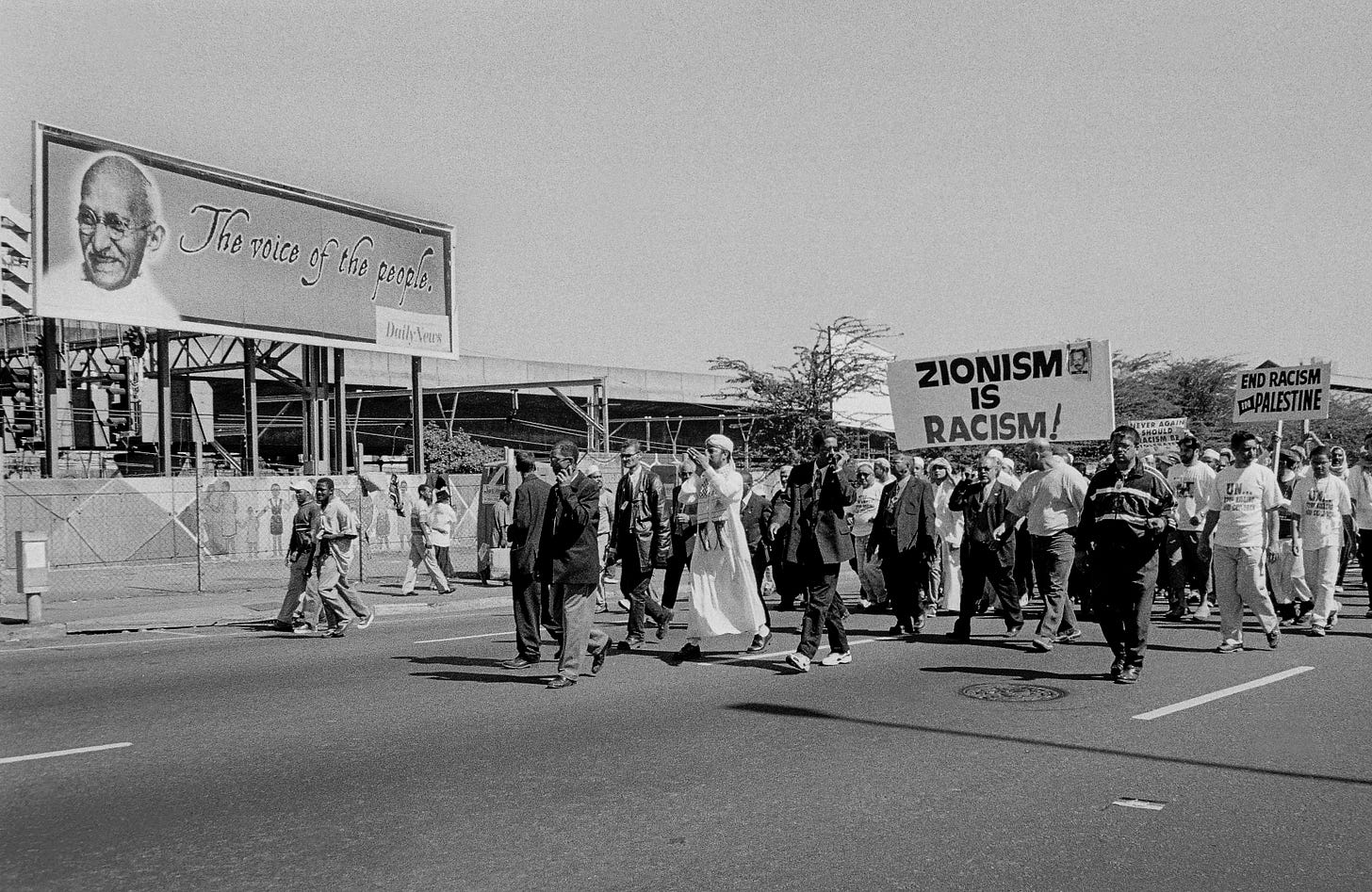
It’s important to note that the understanding of Zionism as an imperial and colonial phenomenon had already taken shape among Palestinian intellectuals in the early 20th century, certainly after the Balfour Declaration. But in the early 2000s, especially following the eruption of the second Intifada, this view migrated to the heart of American academia and later to Western academia more broadly. It also began to take root in international forums in which the West participated. A critical turning point in this context was the United Nations World Conference Against Racism, held in Durban, South Africa, in September 2001.
At that conference, held about a year into the second Intifada, Israel, with the help of the US and several Western countries, succeeded in blocking harsh official resolutions against it. However, in a parallel and significant international forum of human rights organizations held as part of the conference, Israel faced unprecedented and scathing criticism. In the forum’s final declaration, Israel was condemned as a criminal apartheid state and grouped with countries that occupy and violate human rights. It was accused of ethnic cleansing, acts of genocide, racist crimes against humanity, and more. Israel was called upon to allow the return of Palestinian refugees from 1948, to restore their property, and to compensate them. The declaration called for a comprehensive and absolute boycott of Israel, similar to the boycott once imposed on apartheid South Africa.
Just days after the conference, the 9/11 attacks occurred, and President George W. Bush's declaration of a global war on terror dramatically altered the course of history.
Israel’s ‘Discursive Iron Dome’
Israel’s response to these developments was to further intensify international Holocaust discourse, which was still tied to human rights. The 2005 UN resolution establishing January 27 as International Holocaust Remembrance Day is one example. The resolution was initiated by the Israeli Foreign Ministry with a clear purpose – as Ron Adam, a member of Israel’s UN delegation at the time and essentially the architect of the initiative, would later explicitly state: to offer an alternative to the Palestinian narrative, which had become dominant in UN institutions.
The resolution itself has a highly universal character. It mentions Jews only once and makes no reference to the State of Israel. In contrast, the word "rights" or “right” (as in human rights) appears nine times, and the resolution refers extensively to articles from the 1948 Universal Declaration of Human Rights and the UN Convention on the Prevention and Punishment of the Crime of Genocide from the same year. It was a very universal declaration that didn’t mention Israel at all. Nevertheless, the Israeli delegation deliberately compromised on the wording in order to gain broad support from UN member states. They knew well that, in the end, the fine details mattered less. What would be fixed in global consciousness was that International Holocaust Remembrance Day is automatically associated with the tragedy of the Jews and the State of Israel, even if this was never explicitly stated. And they were right.
Another outcome of these processes was the initiative by Israel and its supporters to equate harsh criticism of Israel and opposition to Zionism with antisemitism – a process that reached its peak in 2016 with the publication of the International Holocaust Remembrance Alliance (IHRA) working definition of antisemitism, which was adopted by many Western countries and even beyond. This definition effectively turns Palestinian anti-colonial discourse into an expression of antisemitism. For example, the claim that Israel is a racist state is considered antisemitic. So too is the denial of the Jewish people’s right to self-determination, even though Israel’s official policy is the denial of the Palestinian people’s right to self-determination.
Moreover, according to this definition, drawing comparisons between contemporary Israeli policy and that of the Nazis is considered antisemitism, even though in Israeli political discourse, comparisons of Palestinians or their leaders to Nazis have been extremely common since the founding of the state. The IHRA definition of antisemitism has become what the Israeli philosopher Adi Ophir called “Israel’s discursive Iron Dome.” In this way, Holocaust memory – as it was shaped and institutionalized by powerful states and institutions – became a mechanism for shielding Israel and Zionism from criticism, enabling the occupation and the apartheid, and preventing any meaningful discussion about the Nakba. It also narrowed the discussion on future political solutions. The supposedly universal dimension of Holocaust memory has been steadily eroded.
Then came the October 7 massacre and the genocide that followed.
An ‘Enabling Factor’ for Genocide
The massacre and its accompanying atrocities (such as the destruction of communities, the 250 hostages, and sexual violence) struck with shock and trauma not only among all Israelis, but also among many others around the world. At this point, the fracture between the “universal” and the “particular-Jewish” components of Holocaust memory became an unbridgeable chasm: the “pro-Jewish” sentiment, which morphed into unconditional support for Israel and its murderous war following October 7, was completely severed from the universal sentiment of human rights.
Holocaust memory not only failed to generate any criticism of Israel, but it also actively served to justify the genocide in Gaza and blocked any effective critique of it.
Thus, as Zoé Samudzi has shown, October 7 was perceived by Israel and the West as a second Holocaust, and Israel – one of the most powerful military powers in the world – was once again seen as the ultimate victim, as Jews standing helpless before a new Nazi threat. The widely repeated statement that October 7 was the deadliest day for Jews since the Holocaust – though factually true – constructs a false analogy, as if there is a direct continuity and connection between the two events.
And because the war is seen as being waged against Nazis, and in order to prevent a second Holocaust, the once-naïve (and somewhat hypocritical) imperative of “Never Again” a holocaust, becomes a sadistic and cruel imperative of “Again!” – because of the Holocaust. And the commandment “Thou shalt not kill” becomes “Thou shalt kill!” – because of the Holocaust.
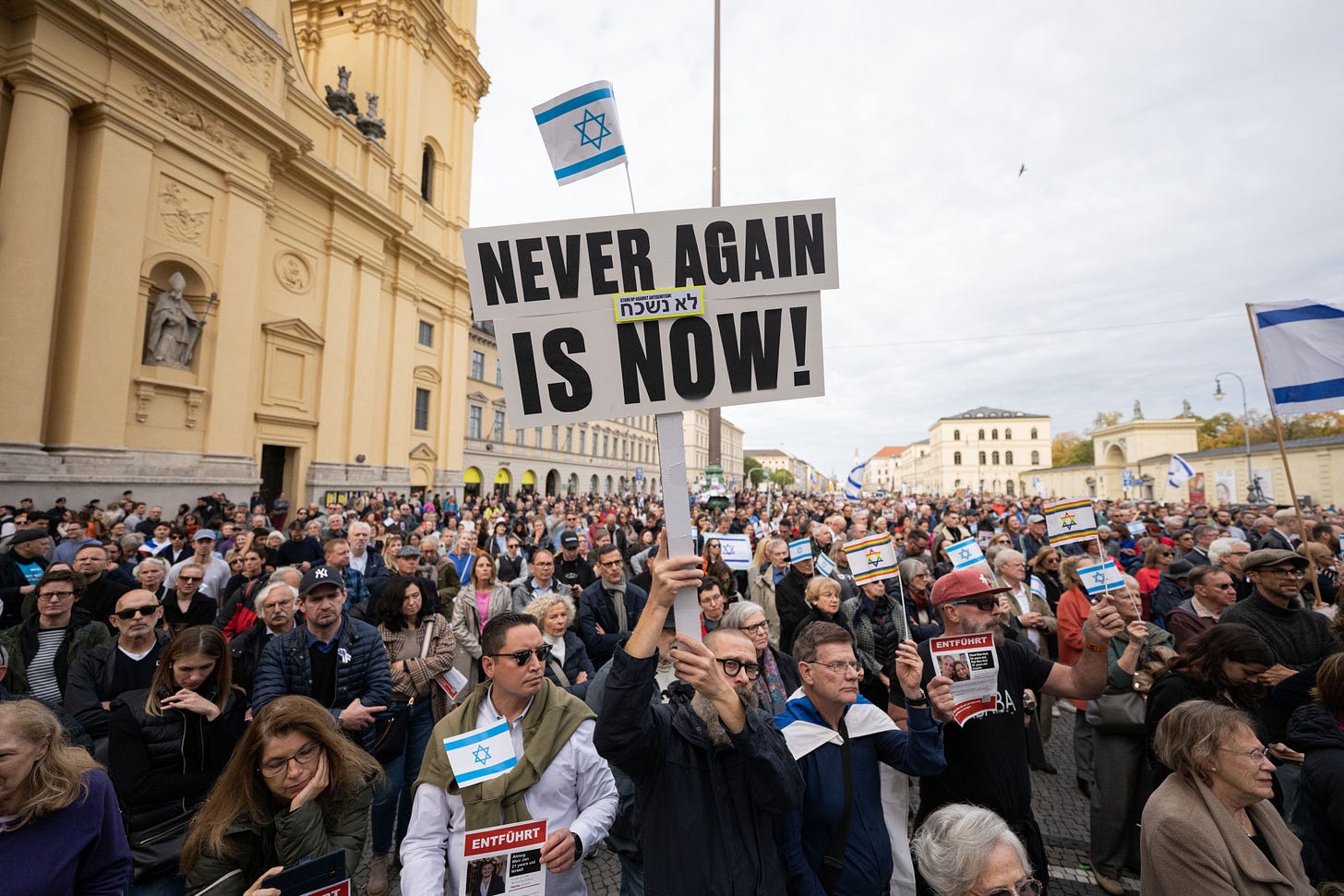
Genocide, ethnic cleansing, dehumanization, and racism were now justified and normalized as the primary lesson of the Holocaust, particularly in Israel, Germany, and the United States.
On the other hand, the "fight against antisemitism" – as a central lesson supposedly learned from the Holocaust – now serves as a pretext for dismantling effective criticism of genocide, and as a tool for governments to suppress basic democratic institutions – first and foremost, universities – while gradually or rapidly sliding into authoritarianism, or perhaps something worse. The examples from the United States are well known, but similar dynamics are unfolding elsewhere as well, especially in Germany, where authorities violently suppress any protest against the genocide in the name of "fighting antisemitism.”
Katharina von Schnurbein, the European Union's Commissioner for Combating Antisemitism, recently claimed that a simple act of solidarity with Palestinians, such as baking and selling cakes, is "ambient antisemitism." Meanwhile, memorial centers at former concentration camps, such as Buchenwald, have issued brochures listing supposedly antisemitic symbols, including the keffiyeh and even the call for a ceasefire.
In February 2022, then-US Secretary of State Antony Blinken chose to come to the United States Holocaust Memorial Museum in Washington to announce that the US recognizes Myanmar's attack on the Rohingya in the Rakhine state as genocide. Blinken emphasized that he specifically came to the Holocaust museum to make this declaration because Holocaust memory imposes on us a contemporary moral responsibility. He also noted his personal connection to the Holocaust, as his stepfather was a survivor himself.
The evidence of genocide in Myanmar, as well as the extent of destruction and murder there, is horrific and devastating. But what is taking place in Gaza seems to be even worse, and the evidence for genocide is much clearer. Yet, can anyone imagine Blinken – or anyone else – appearing at the Holocaust museum in Washington to declare, out of a commitment to Holocaust memory, that Israel is committing genocide in Gaza? The opposite is true. Nearly all of the many hundreds – perhaps thousands – of Holocaust remembrance institutions worldwide have remained silent about the crimes in Gaza. So have most Holocaust scholars. Some of the institutions and scholars have even explicitly sided with Israel.
Moreover, simply drawing comparisons between Israel and the Holocaust, and contrary to what we have just seen in regard to Myanmar, for example, is seen as antisemitic. The position of the American Jewish Committee (AJC) is typical in this regard:
“These comparisons are not simply misguided or exaggerated… On one hand, they trivialize the Nazi atrocities… On the other, they invert historical roles, casting Jews—victims of an unparalleled genocide—as today’s oppressors… The result is an assault on memory itself… and, most urgently, the rising antisemitism…”
Thus, mainstream Holocaust memory has become part of the problem of genocide instead of part of its solution. It has become what scholars call an “enabling factor” for genocide, rather than a preventive force that cultivates moral sensitivity and political awareness to help fight genocide and mass violence. Today, the dominant political interpretation in Israel and most of the Western world of the phrase “Never again” resembles more than anything the “Never Again” of Rabbi Meir Kahane (the racist spiritual father of Itamar Ben-Gvir), which was also the title of his 1971 book.
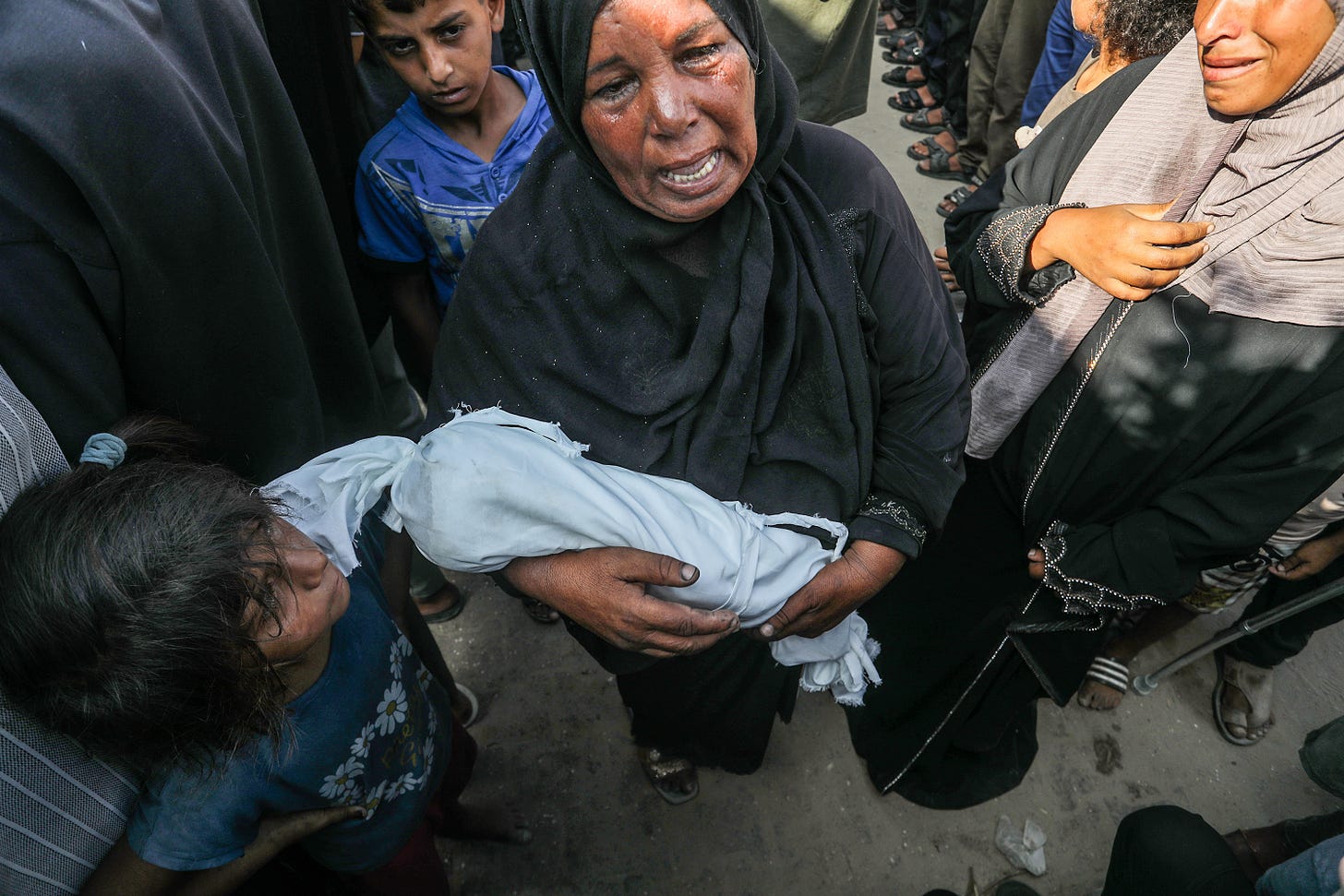
That said, I would like to qualify my comments in closing. While it’s true that the mainstream of Holocaust research and memorial institutions tend to cooperate with – or at least enable – the genocide in Gaza, as Shira Klein has shown, the field of Holocaust studies itself is highly fragmented (though its institutions are not). Out of this field have emerged several scholars, such as Raz Segal, Omer Bartov, and others, who have articulated some of the most precise and incisive criticisms of Israel’s actions in Gaza, identifying them as genocide, even in its early stages.
In January 2024, a group of 56 Israeli scholars sent a letter to Yad Vashem, Israel’s official Holocaust remembrance authority, demanding that it condemn the growing calls for genocide against Palestinians spreading throughout Israeli society. Yad Vashem refused. I ended the op-ed I wrote for the Israeli newspaper Haaretz on the matter with the question: If Yad Vashem is not even capable of condemning explicit calls for genocide, 'why does it even exist?”
This question, asked in January 2024, is 10 times more urgent and pressing in July 2025 – and it must now be placed squarely at the doorstep of every Holocaust remembrance institution in the world.
In our 2018 co-edited book The Holocaust and the Nakba: A New Grammar of Trauma and History, Bashir Bashir and I suggested an alternative to a joint Palestinian-Israeli memory which leads to "egalitarian binationalism" that will replace Western and Israeli mainstream exclusive Holocaust memory. I believe this kind of memory, which will also include deliberation on the current genocide in Gaza, is more essential today than ever.
Amos Goldberg is a professor of Holocaust History at The Hebrew University of Jerusalem.
The views expressed in this article are the author’s own and do not necessarily reflect those of Zeteo.
Editor’s note: An extended and partially different version of this essay was published in Hebrew via the Israeli news site, Local Call (Sikha Mekomit).
Check out more from Zeteo:




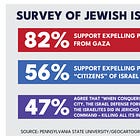

These are the sort of pieces that make this subscription worth it. I don't find these types except in some academic spaces I've been in because when advertisers are on the line then no one wants to ask big questions, or open space to marinate on hard topics that we don't want to discuss but must to grow as a society.
Thank you so much Zeteo for this piece.
A holocaust was committed against the Jews, before the Jews turned around and committed a worse holocaust against the Palestinians. That's the long and short of it.